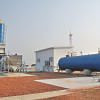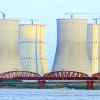First delivery of nuclear fuel takes Bangladesh closer to its goal

Bangladesh is set to get one more step closer to becoming a country with nuclear energy capacity, as the first consignment of nuclear fuel for Rooppur Nuclear Power Plant (RNPP) is scheduled to be handed over in the first week of October. RNPP is the single biggest investment in the history of the country, with 30,000 people, including 7,000 professionals, working on the project. This key energy project, which is expected to operate for 60-80 years, will cover approximately 10 percent of Bangladesh's electricity demand at cheaper rates.
Transport of nuclear fuel, consisting of pellets of uranium, a radioactive element, is strictly guided by the International Atomic Energy Agency (IAEA) standards and regulations. The fuel can be transported by special air cargo, nuclear fuel carrier ships, trains or trucks under high security measures.
The transport model for RNPP fuel will be similar to that for the nuclear fuel delivered to Akkuyu Nuclear Power Plant in Turkiye earlier this year. On April 27, the presidents of Turkiye and Russia joined an online ceremony to mark the arrival of the first consignment of fuel at Akkuyu, which was implemented under the build-own-operate (BOO) model. According to Turkiye's energy ministry, the nuclear fuel was first brought in by air from Russia, then loaded on trucks and transported to the Akkuyu plant site. The uranium pellets, which were transported in protective containers and whose radiation measurements were taken, did not pose any security risk.
In Bangladesh, after the consignment of fuel arrives in Dhaka, it will be loaded onto a special truck and transported to the RNPP site, under a security protocol to be devised by the Bangladesh Army following IAEA safety standards and national safety rules and regulations.
Before loading the fuel into the reactor core, loading dummy fuel assemblies (DFA) is an indispensable prerequisite process – a kind of a rehearsal. The trial run includes, among other things, handling of transport and process operations regarding the DFA movement from the special fresh fuel storage facility to the reactor building, and confirmation of the refuelling machine readiness. Dummies are true copies of fuel assemblies (FA), having the same design in terms of weight, dimensions and materials, but do not contain the nuclear fuel. They are intended for use during commissioning at the stage of cold and hot tests of the reactor plant, in order to check it for regulatory compliance with design characteristics and safety requirements to protect people and the environment in the surrounding areas.
For adequate accident analysis, the test programmes should include simulation of equipment failures and control system malfunctions that could reasonably be expected to occur during the power plant's lifetime, to ensure that the plant is capable of withstanding the anticipated transients and postulated accidents.
An official ceremony was held in July this year to mark the issuing of licences from the Bangladesh Atomic Energy Regulatory Authority for nuclear fuel. The Class B licence authorises the purchase, ownership, handling and storage of nuclear materials, the Class D licence allows the Russian transport company to transport nuclear materials, and the Class E licence approves the import of nuclear materials. The licences were handed over to the Bangladesh Atomic Energy Commission, the owner of RNPP.
Alexey Deriy, vice-president of JSC Atomstroyexport – a subsidiary of Russia's state-owned company Rosatom – as well as the director of RNPP construction project, said the delivery of nuclear fuel to the plant is a complex multi-level process that should meet all international safety standards. The fuel inspection has been completed in Novosibirsk, a city in Siberia, and is all set to be transported to RNPP.
The Rooppur Nuclear Power Plant represents a fundamental transformation in Bangladesh's economy, energy and technological future. Once it goes into operation, the project is expected to drive the country's annual GDP growth by over two percent. The plant is expected to generate 2,400 MW of electricity every day when in full operation. As nuclear energy is recognised (by the European Commission) as green energy, this will take Bangladesh forward in its target of clean, sustainable energy. Besides industrial and research and development (R&D) opportunities, this project will provide employment to over 12,000 people, including 2,500 highly qualified specialists. Most importantly, this project has paved the way for technology transfer and localisation, development of national infrastructure at such a large scale, and a culture of ensuring safety. The completion of the first unit (RNPP-1) is testament to international collaboration and demonstration of Bangladesh's nuclear capability.
To meet the net zero goal by 2050, traditional renewables alone cannot suffice. The inclusion of nuclear power, now accepted as clean energy, can achieve the de-carbonisation goal.
Dr Shafiqul Islam Bhuiyan is former chairman of Bangladesh Atomic Energy Commission (BAEC) and former professor at the Department of Nuclear Engineering at King Abdulaziz University in Saudi Arabia. He can be reached at [email protected].
Views expressed in this article are the author's own.
Follow The Daily Star Opinion on Facebook for the latest opinions, commentaries and analyses by experts and professionals. To contribute your article or letter to The Daily Star Opinion, see our guidelines for submission.

 For all latest news, follow The Daily Star's Google News channel.
For all latest news, follow The Daily Star's Google News channel. 











Comments